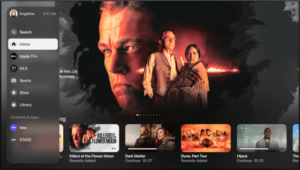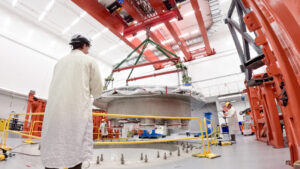11-inch vs 12.9-inch M1 iPad Pro: The screen makes all the difference
[ad_1]
Since the iPad Pro debuted in 2015, Apple has been offering two different sizes of its high-end tablet. One is about the size of a regular iPad or iPad Air (first 10.5 inches and now 11 inches), and the other has always been a bigger 12.9-inch version, a size you can only get in the iPad Pro.
The two sizes have traditionally been essentially the same, with the larger version costing about $200 more. The choice was simple: Pay more for If you want a bigger display. But the new M1-powered iPad Pro isn’t a different animal. For one, the price gap has stretched to $300, but that’s because the 12.9-inch model has a really significant difference—a new HDR display with mini-LED backlights. Here’s how the two Pros attack up and whether it’s worth it to spend so much money on the flagship iPad.
Update 5/28: Added information about the M1 processor and the RAM.
11-inch vs 12.9-inch iPad Pro: Tech specs
| 11-inch iPad Pro | 12.9-inch iPad Pro | |
|---|---|---|
| Starting price | $799 | $1099 |
| Screen size | 11″ | 12.9″ |
| Size (H x W x D) |
9.74″ x 7.02″ x 0.23″ | 11.04″ x 8.46″ x 0.25″ |
| Weight | 1.03 pounds | 1.5 pounds |
| Colors | Silver, space gray | Silver, space gray |
| Display | Liquid Retina, ProMotion, True Tone, 600 nits brightness |
Liquid Retina, ProMotion, True Tone, 1000/1600 nits brightness |
| Processor | M1 | M1 |
| Storage | 128/256/512GB/1TB/2TB | 128/256/512GB/1TB/2TB |
| Authentication | Face ID | Face ID |
| Rear camera | 12MP f/1.8 Wide 10MP f/2.4 Ultra Wide LiDAR scanner |
12MP f/1.8 Wide 10MP f/2.4 Ultra Wide LiDAR scanner |
| Front camera | 12MP f/2.4 Ultra Wide | 12MP f/2.4 Ultra Wide |
| Wireless features | 5G, Wi-Fi 6, Bluetooth 5.0 | 5G, Wi-Fi 6, Bluetooth 5.0 |
11-inch vs 12.9-inch iPad Pro: Everything that’s the same
Like previous years, the two tablets have the same processor (Apple’s M1), storage options (128GB to 2TB), same front camera (12MP True Depth) same rear camera (12MP wide + 10MP ultra-wide), same quad-speaker array, and microphones, same wireless connectivity (Wi-Fi 6 + 5G), even the same estimated battery life (about 10 hours on Wi-Fi).
That is to say both iPads are the very best iPads Apple has ever made. The M1 processor is faster even than the A14 in the iPhone 12 and iPad Air, you get full sub-6Ghz and mmWave 5G connectivity instead of LTE, and even the selfie camera got an overdue upgrade. According to speed tests, the M1 is just as fast as it is on the Mac, so either iPad Pro you buy will be a ridiculously fast and powerful tablet that will handle everything you throw at it for years to come.
11-inch vs 12.9-inch iPad Pro: RAM
The new iPad Pro is Apple’s first tablet with RAM listed in the tech specs. And it has a lot more than before. While the previous generation iPad Pro had 6GB of RAM, the new model has either 8GB or 16GB, depending on the storage. You get 8GB of RAM with 128GB, 256GB, or 512GB storage, and 16GB RAM with 1TB or 2TB storage. The extra RAM adds an extra $200 to the price, and we’re not really sure what benefit there is at the moment. According to a tweet from Procreate, apps have a hard 5GB limit no matter whether the tablet has 8GB or 16GB. That might change with iOS 15, but for now, that pricey extra RAM isn’t all that useful.
11-inch vs 12.9-inch iPad Pro: Liquid Retina XDR
There are two differences when it comes to the display: the size and the brightness. While the 11-inch iPad Pro has Apple’s Liquid Retina LCD, the 12.9-inch model introduces what Apple calls a “Liquid Retina XDR” display to the iPad line. It’s very similar to Apple’s Pro Display XDR in that it uses an array of thousands of micro-LED backlights arranged in 2596 lighting zones to give it amazing brightness and contrast.
Just to be clear, XDR isn’t actually a thing—it’s just Apple’s marketing name to try to make its HDR displays sound better than regular HDR. But it makes a strong case for superiority: a 1,000,000:1 contrast ratio, P3 wide color gamut, and full-screen brightness of 1,000 nits (with peak brightness of 1,600 nits)—not to mention True Tone, and ProMotion—make this one of the best HDR displays you can get anywhere. It’s right up there with the best 4K TVs, and it’s going to make HDR video content look fantastic.
Apple
While the 11-inch model can handle HDR video content, its peak brightness of 600 nits doesn’t really produce enough brightness and contrast to make HDR look like HDR unless the brightness is amped up and conditions are ideal. With the 12.9-inch iPad Pro, that won’t be an issue. Video content will look stellar and images and apps will be bright, crisp, and incredibly detailed. As Apple describes it, “Even the most detailed HDR content with the finest specular highlights — like galaxies and action movie explosions — are more true to life than ever.”
The display is the real reason that the 12.9-inch model now costs $300 more than the 11-inch model, instead of $200 as in years before. It’s a lot, but the extra $100 for the XDR display will surely be worth it to anyone who watches movies and TV shows on their iPad.
11-inch vs 12.9-inch iPad Pro: A tiny difference in thickness
One small detail to note about the 12.9-inch iPad Pro is that the new display makes it ever-so-slightly thicker than the previous model. It’s only a 0.5mm difference, two-hundredths of an inch, but it’s there. It’s enough that Apple had to tweak the latest Magic Keyboard a little bit in order to close neatly. Apple says you can use the Magic Keyboard made for last year’s 12.9-inch iPad Pro to work since the other dimensions are the same, but it won’t be perfectly flush when closed.
11-inch vs 12.9-inch iPad Pro: Storage is steep
The 11-inch iPad Pro starts at $799 and the 12.9-inch iPad Pro starts at $1,099, so they’re certainly not cheap. But when you look at the storage options, the prices are enough to make your head spin:
| 11-inch iPad Pro | 12.9-inch iPad Pro | |
| 128GB | $799 | $1,099 |
| 256GB | $899 | $1,199 |
| 512GB | $1,099 | $1,399 |
| 1TB | $1,499 | $1,799 |
| 2TB | $1,899 | $2,199 |
The 1TB and 2TB tiers are a lot more than before. The reason why is because of the RAM. Because the new iPad Pro has an M1 processor, it also has 8GB of RAM, which is already more than any iPad has ever had before. But if you get the 1TB or 2TB model, you’ll also get 16GB of RAM, which jacks up the price by another $200. We’re not sure we’d recommend that much RAM or storage in an iPad, but if you can afford it, go for it.
11-inch vs 12.9-inch iPad Pro: Going big will cost you
We already established he extra $100 price gap this year is more than justified by the 12.9-inch’s mini-LED display, but you’re probably not going to pay only $300 more. Some accessories cost more for the larger model than the smaller one.
You’ll almost certainly want to pick up an Apple Pencil, which is $129 no matter what iPad you have, but it’s the cases that’ll get you. The Magic Keyboard is $299 for the 11-inch iPad Pro and $349 for the 12.9-inch iPad Pro. The simple Smart Folio is $79 for the smaller iPad Pro and $99 for the larger one. The Smart Keyboard Folio is $179 for the smaller model and $199 for the larger one. Most third-party cases, covers, and keyboards follow suit—for example, Logitech’s Combo Touch is $199 for the smaller model and $229 for the larger one.
The 11-inch iPad Pro is a fantastic machine and one of the best tablets ever made, but if you decide to get the 12.9-inch iPad Pro, you’re making an investment. It’s not just the extra expense, but also a decision to get the best, most luxurious tablet Apple has ever made. And believe us, you won’t regret the decision.
I have written professionally about technology for my entire adult professional life – over 20 years. I like to figure out how complicated technology works and explain it in a way anyone can understand.
[ad_2]
Source link






